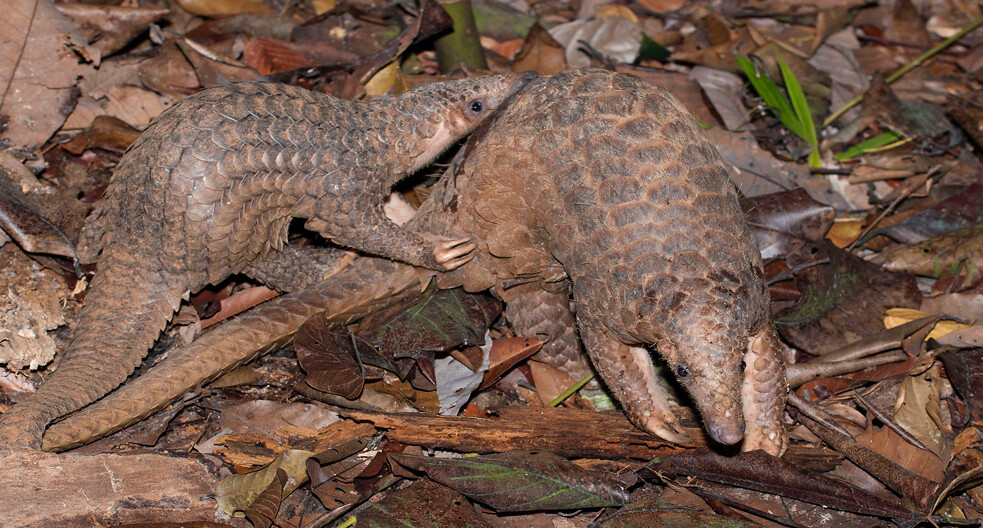New research suggests pangolin coronaviruses, Pangolin-CoVs, are more closely related to the Covid-19 virus, SARS-CoV-2, than the RaTG13 coronavirus of bats and the illegal trade of pangolins may have accelerated transmission.
The origin of the Covid-19 virus (SARS-Cov-2) is still unclear, despite comprehensive research. Upon the earliest reports of Covid-19 cases in humans in late-2019, the finger was promptly pointed towards the consumption of bats. Horseshoe bats (Rhinolophus spp.) are known to transmit a subgenus of sarbecoviruses, to which SARS-CoV-2 belongs. The SARS-CoV-2 genome is thought to show a 96% concordance with its closest relative, RaTG13 betacoronavirus, which infects the intermediate horseshoe bat (R. affinis). An article published in 2020, however, argued that RaTG13 had a markedly low affinity for human cell receptors. It is likely, therefore, that an intermediate vector species enabled the transmission of SARS-CoV-2 from bats to humans. Enter the Malayan pangolin (Manis javanica).
Though the Malayan, or Sunda, pangolin can be located throughout Southeast Asia, the International Union for Conservation of Nature (IUCN) recognises it as a Critically Endangered species. Due to a controversial belief that this species holds medicinal value in Eastern Asia, the Malayan pangolin is one of the most harvested mammals, globally, and faces probable extinction. The keratin-rich, plated armour of pangolins supposedly alleviates multiple minor ailments and disabilities, such as arthritis or nausea. Despite a conspicuous absence of evidence supporting the medicinal use of pangolin scales, and increasing legal enforcement against trading, the future of pangolins remains doubtful. Approximately 29 tonnes of pangolin scales are imported to China each year, and it is plausible that the transmission of SARS-CoV-2 to humans originated in pangolin products.

In their 2021 paper published in Nature Communications, Antoni Wrobel et al. claim the ability to bind to ACE2 (Angiotensin-converting enzymes located on human cell membranes), plus the structure of virus S proteins, enable Pangolin coronavirus (Pangolin-CoV) transmission to humans. Wrobel et al. found pangolin-CoV was much more likely to bind to human ACE2s than the RaTG13 bat coronavirus. Furthermore, the S proteins of pangolin-CoV were more compatible with human ACE2s than RaTG13 S proteins. The results of this research imply the transmission of SARS-CoV-2 and the emergence of Covid-19 were made possible through close contact with intermediary species, such as pangolins. RaTG13 viruses are much less adapted to human transmission than pangolin-CoVs. Early accusations towards Rhinolophus bats as the sole source of novel Covid-19, therefore, may be inaccurate. The similarity between pangolin ACE2s and those of human cells likely enabled successful transmission. Covid-19 can be attributed to the consumption of RaTG13-infected horseshoe bats and pangolin products, but it is highly possible that there were multiple, unidentified species, alongside the Malayan pangolin, transmitting SARS-CoV-2 to humans. Future research may identify several host species involved in the emergence of Covid-19, which might outline the risks associated with harvesting exotic animal products.
Fortunately, Chinese authorities have recognised the hygienic concerns associated with livestock markets and wildlife trafficking. Several ‘wet markets’, where live animals are slaughtered upon purchase, were shut down in February 2021 and the trade of several exotic species, including pangolins, banned. The legitimacy of these actions, however, is weakened given the failure of previous legislation. A 2016 agreement put forward by CITES (Convention on the International Trade in Endangered Species), of which China has been a member for over thirty years, banned the international trade of pangolins and associated products. After the importation of pangolin scales continued, the Chinese government implemented a ban on all medicinal products of pangolin origin in 2019. Whether the latest legislations ensure legitimate protection against pangolin harvesting remains to be seen. Currently, at over 118 million cases and 2.61 million deaths worldwide (as of 12th March 2021), the Covid-19 pandemic could, and should, motivate a decline in illegal pangolin trade and arbitrary medicinal practices.

